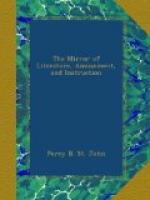He made no secret of his intention among his friends, and one, in particular, was privy to his whole course of preparation. This was Mr. McCrab, a pungent little personage, whose occasional petulance and acrimony, however they might rankle and fester in more sensitive natures, were never known to curdle the bland consciousness of self-esteem which dwelt, like a perpetual spring, upon the mind of Mr. Stubbs. Mr. McCrab was himself an amateur actor; he had also written a tolerably successful comedy, as well as an unsuccessful tragedy; and he was, besides, a formidable critic, whose scalping strictures, in a weekly journal, were the terror of all authors and actors who were either unable or unwilling to dispense turtle and champagne.
Mr. Stubbs, it should be mentioned, considered himself a profound reader of Shakspeare, and believed he had discovered many hitherto concealed beauties in the wonderful productions of that writer. He prided himself, too, upon the critical acumen and philosophical penetration with which he had elicited various qualities intended by the poet to belong to his characters; and he had often said if he had been an actor he should have established quite a new method of playing several of them. He was now about to become an actor, and he resolved, in his very first essay, to introduce one of his novelties, or new readings. What this was, will be best explained in the following conversation, which took place between himself and Mr. McCrab upon the subject.
“Depend upon it, my dear McCrab,” said Stubbs, taking down a volume of Shakspeare from his shelves, “depend upon it, I am borne out in my opinion, novel as it is, by the text of the immortal author himself; and I shall stuff the character when I play it. I maintain Hamlet ought to be”——“A Falstaff in little, I suppose,” interrupted McCrab. “No,” rejoined Stubbs, “he should not be exactly corpulent—but rather embonpoint, as the saying is—sleek—plumpish—in good condition as it were.”
“You talk of the text of Shakspeare as your authority,” replied McCrab,—“I will appeal to the text too—and I will take the description of Hamlet by Ophelia, after her interview with him. What is her language?
’Oh what a noble mind is here o’erthrown!
The expectancy and rose of the fair state:
The glass of fashion and
the mould of form,
The observed of all observers.’
This eulogium paints in distinct colours what should be the personation of Hamlet on the stage. It demands, not a little fellow, five feet five, by three feet four, as you will be, if you stuff the character as you call it, but rather what Hamlet himself describes his father to have been,
’A combination, and a form indeed.
Where every god did seem to set his seal,
To give the world assurance of a man.’”
“Never mind my height,” said Stubbs, elevating his head, and raising his chin an inch or two out of his neckcloth.—“Garrick, you know, was none so tall; and yet I fancy he was considered a tolerably good actor in his day. But you remember the lines of Charles Churchill,




